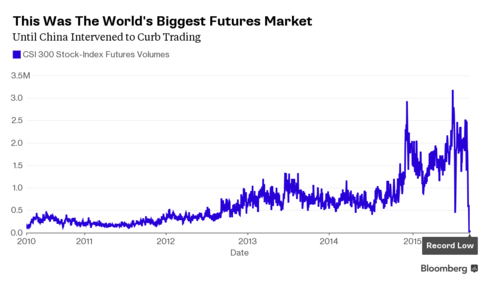Five months ago, in the aftermath of its biggest market crash since 2008, China unleashed an unprecedented series of measures to stem the selling tide, none more mindblowing than its threat (which was promptly executed) to arrest “malicious short sellers” or even worse. It did just that as the following stories recount:
The result of all these ridiculous interventions was two-fold: China effectively killed the market, as can be seen by the following chart of volume on China’s futures market, until recently the world’s biggest which overnight evaporated after China made it practically impossible to trade anything…

… and as a result of the PBOC being the last standing player, the Chinese “stock market” would now trade precisely as its central planners demanded it to. Too bad nobody else will participate.
But now that China has gotten its stock “market” under control, it was time to focus on a market that is far more important to China’s economy – that of commodities. After all, while several dozen million may have gotten very rich and then very poor over the summer, the implications of the Chinese stock bubble and subsequent burst were mostly contained. However, when it comes to plunging commodity prices, these have a far greater impact on both China, where fixed investment is about 50% of GDP, and as a result impact everyone, as well as the world.













Leave A Comment